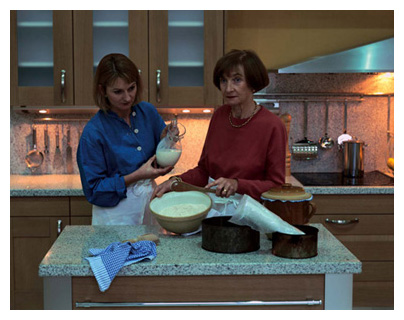Heavy Gleam of Domesticity: The Seven Sacraments by Abigail O’Brien
Jessica Brown
 Abigail O’Brien, an Irish artist, took a decade to complete her magnanimous series of installations The Seven Sacraments. A visual meditation using different mediums—photographs, found objects, needlepoint, sculpture—this series explores the interplay of domestic life and its tangible chores with the tangibility of the sacraments, and their concrete expressions of grace. Basin, water, linen, flour, bread, fish, goblet, lilies, grapes: this list conjures items both mundane and holy—daily tasks in the realm of home as well as those made vital to the public ministry of Jesus Christ and ecclesiastical rituals.
Abigail O’Brien, an Irish artist, took a decade to complete her magnanimous series of installations The Seven Sacraments. A visual meditation using different mediums—photographs, found objects, needlepoint, sculpture—this series explores the interplay of domestic life and its tangible chores with the tangibility of the sacraments, and their concrete expressions of grace. Basin, water, linen, flour, bread, fish, goblet, lilies, grapes: this list conjures items both mundane and holy—daily tasks in the realm of home as well as those made vital to the public ministry of Jesus Christ and ecclesiastical rituals.
Photographs in O’Briens The Last Supper – Matrimony (1995) are composed so that the lit faces of women preparing for a wedding cannot help but remind us of the facial illuminations in Leonardo da Vinci’s famous painting. The richly hued lines utter a gleam of holiness in the human face and wine bottles, a wedding gown and wedding cake.
In Kitchen Pieces – Confession and Communion (1998) are photographs of bread, fish, and fruit on a black countertop again gleaming in such a way to reference Dutch and Spanish still lifes, brimming with sparkling fruit and shiny fish, themselves symbols of the sacraments. Photographs of women poised in the act of cooking are arranged in such a way to reference the beautiful comfort of Dutch interior paintings, women cooking or sewing by the glowing hearth.
What do we do, as our brains encounter such material as to make these connections between baking bread or cutting lemons with the grace of God as offered through the forgiveness of sins? I think the most uncomplicated response is one of affirmation: the sphere of domesticity is one that gleams with eternal meaning. The vita activa is not necessarily devoid of vita contemplativa, for our chores share the very tangibility that Christ treasured for his own ministry. The meaning of home can even inform how we enter the sacraments: God offers water for washing, warmth from a well-lit and enduring fire, and indeed, a place at the table set with the nourishing sustenance of wine and bread.
But there is an edge to O’Brien’s work. The Last Supper carries an undercurrent of bizarre but expected performativity, the pressure to carry out ritual in a certain way. The expression of the woman (supposedly the bride) getting her nails done is one of sober consternation. In Kitchen Pieces, the very paintings that refer to the domesticity of Dutch interiors are set in mock-up kitchens in a showroom, literally for show. The last two photographs feature a young girl in a kitchen baking bread; but the in second photo, the girl is gone, with only flour marking her place. Is this what happens when a person enters into the rituals of home-making or religion, that she loses herself?
There will always be a performative, and potentially destructive, side to rituals. The pressure to do things “right” churns within. We want our domestic tasks and the fruit of faith to be excellent, ripe, generous, lovely. And this is when the meaning of sacrament can inform how we enter ritual, domestic or religious. Sacrament is grace, and grace expects not performance but presence. Grace welcomes the transparency to admit our very inability to perform certain expectations.
The installations by Abigail O’Brien are stunning and disturbing. For me, they prompt a prayer. As we affirm the sacramental nature of daily chores—the holy gleam, as it were—may we remember to let grace affirm us, and free us from the burdensome threats of relentless perfectionism.